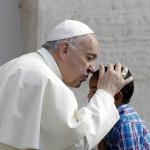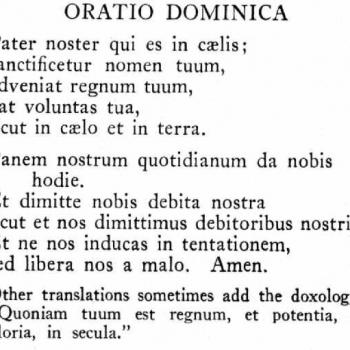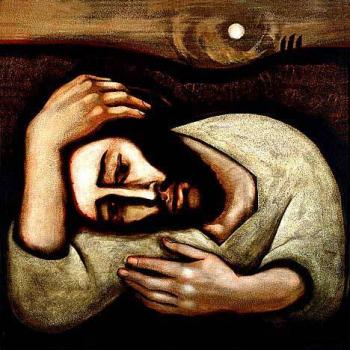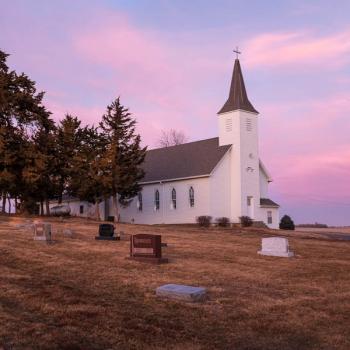Your kingdom come.
We are looking again at the Our Father, the Lord’s Prayer. So far Jesus has urged us to call the Lord Most High God of Israel “Father” and more particularly, “Our Father.”
Right away, Jesus has told us something about the Gospel, the good news of the Father’s unconditional commitment to humanity through Christ. To call God our Father is a summarization of our need and of his abiding promise.
In calling on God, we have also asked for his Word. We are praying that amid all the words that crowd upon us and swirl around us, distracting and misdirecting, the Father will speak to us clearly in a voice of truth that is all Truth.
Thy kingdom come, the next petition, flows from the first.
When we ask “Thy kingdom come,” what are we finally asking of God? Well, just that: we want his kingdom to come to us to control us, to claim our allegiance against all other claims. That means we want no other kingdom but his.
A problem, though. Kingdoms in our American experience are few, and the history we had with the last king of America proved disagreeable. Here, we Americans speak of the people reigning, sovereign in their own power. A king in his kingdom speaks of power, dominion, where we are in the grip of an authority outside of us, an old fashioned anti-democratic kingdom.
So, I’d guess, in the deepest or even the most shallow recesses of the human heart, we do not pray “Thy” but “My kingdom come.” We want sovereignty over our own lives; a life where nobody is the boss of me.
I want my kingdom where my name is hallowed, where my will is done. In my kingdom all those people in my house would turn out unnecessary lights and I’d never get stuck behind somebody with 20 items in the 12 item checkout at the grocery, and if it was my 20 items, no one would complain. That’s really pretty modest, isn’t it? If I get that much under control I might expand my ambitions.
But it is the Father’s kingdom for which I pray; not my own. That is what we pray when we pray “Thy kingdom come.” We seek his kingdom in opposition to all others, and especially in opposition to our own. Well, crud.
But now, the good news – maybe it’s good news – is we can hardly prevent the Father’s kingdom from coming in any case. As Tertullian (d. 240) not unreasonably pointed out, God’s kingdom will come whether we pray for it or not. So there.
If that’s the case, why pray it at all? This is easy. We pray that his kingdom will come also for us. We pray that we will have the faith to recognize it and welcome it when it does.

We ask that the Father’s kingdom will come to us in a clear conclusive way so that we are grasped by it tightly, protectively. More especially that we are grasped and held by no other. So we pray, “Thy kingdom come.”
All too frequently, however, the Father’s kingdom looks scrawny. There are other powers loosed around us, other allegiances vying for our hearts, some in fact are more to our liking. Against these, a distant kingdom coming is too easily overcome by our despair, fear, confusion; our conceits, vanity, pride. God’s kingdom, this life says, cannot be relied upon, not for the real things we finally need. Besides, nobody can be the boss of me.
So there are other powers eager to dominate our thoughts and hearts, other powers jeopardizing our hope of the kingdom for which we prayed. You don’t have to look far. Looking closely inside of us we sometimes find nothing but our own fears, our own struggles, our own crises and cries, our own denials and addictions, our own bitterness and unfilled wants.
These are not the devil’s snares; life itself provides them. They bubble up from within us, literally moment to moment in every day. Something wicked may exploit them, but they belong first to our selves. We get caught by these, paralyzed in faith, and we are not able to find within us the hope, the faith, or the courage to move.
Here, in that captivity is when we must pray, “Thy kingdom come!” It is a prayer wrung from life itself, a cry for the clarity of our Father’s kingdom rushing in upon us.
You, dear Father, is what we pray, you take hold of my life now in such a way that I can count on you in every faltering doubt, in every low and frantic moment. You, Father, you take hold of my heart now and wrest it to your control, because as you take hold of me, then I know I shall be free.
And he comes ― gently, lavishly in his Word, comes in the memory of Baptism, comes to us by those treasured words “The body of Christ,” comes in such a way that once again our unsteady, wavering, and anxious heart — so easily dominated by all the threats of life — might once again find safety and surety in the hands of Christ.
“Our hearts are restless,” St. Augustine put it, “until they find rest in you.”
Russell E. Saltzman lives in Kansas City, Missouri. His latest book is Speaking of the Dead. He can be reached at [email protected], on Twitter @RESaltzman, and on Facebook as Russ Saltzman.












